Criminal Justice and the Media: The CSI Effect on Juror Expectations
VerifiedAdded on 2021/11/18
|9
|911
|64
Essay
AI Summary
This essay examines the CSI Effect, a phenomenon where forensic science television shows influence jurors' expectations of evidence in criminal cases. It defines the CSI Effect, highlighting how these shows lead to unrealistic expectations of forensic tests, particularly DNA evidence. The essay explores the impact of the CSI Effect on viewers and jurors, including difficulties in prosecuting defendants and potential limitations on the pool of jurors. It discusses whether prosecutors should question jurors about their viewing habits and analyzes cases where scientific evidence is absent. The research concludes that the CSI Effect stems not only from media exposure but also from cultural changes, suggesting that criminal justice systems should adapt to these shifts. The essay references several sources to support its claims, providing a comprehensive overview of the CSI Effect's influence on the legal system.
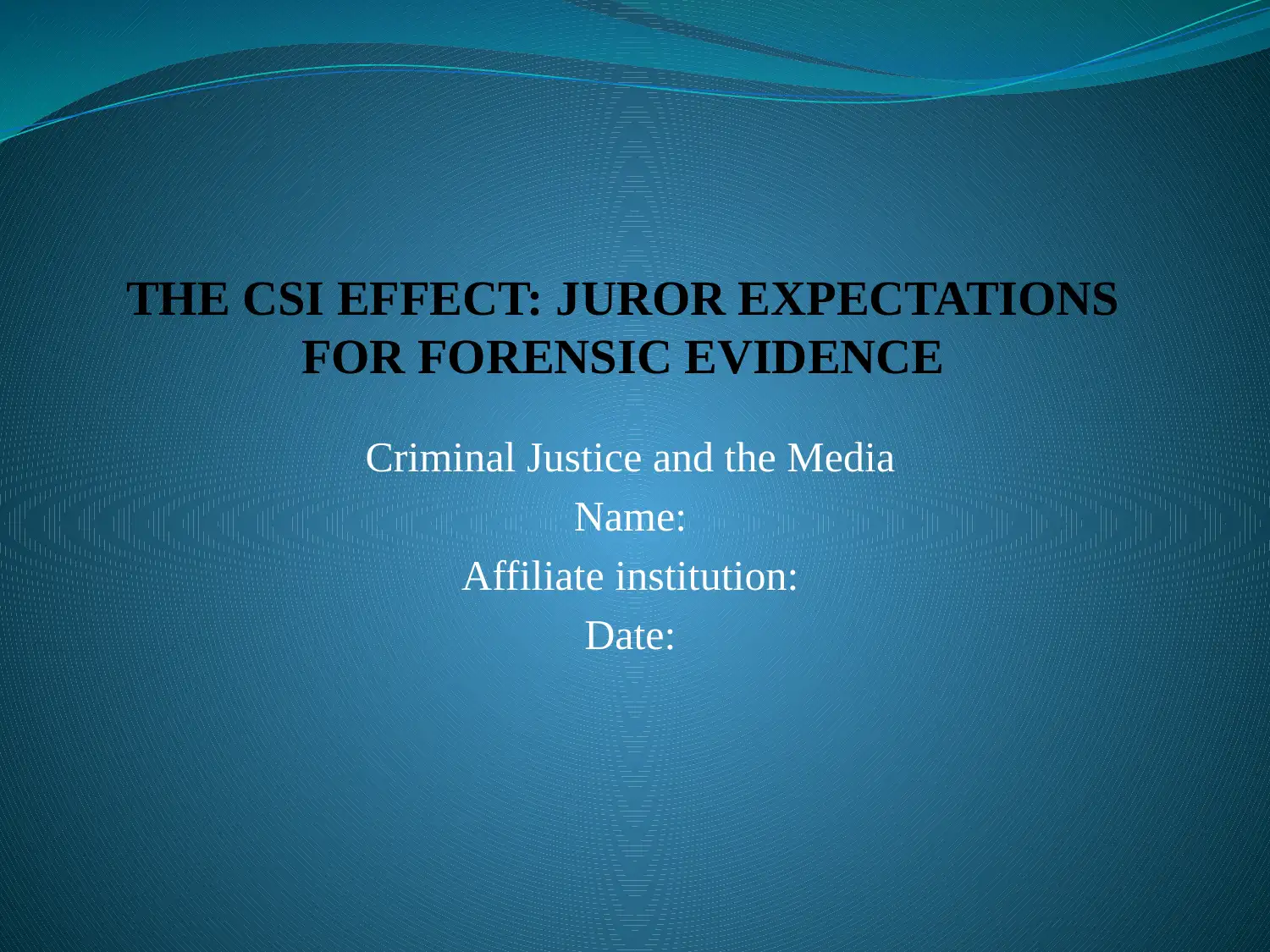
THE CSI EFFECT: JUROR EXPECTATIONS
FOR FORENSIC EVIDENCE
Criminal Justice and the Media
Name:
Affiliate institution:
Date:
FOR FORENSIC EVIDENCE
Criminal Justice and the Media
Name:
Affiliate institution:
Date:
Paraphrase This Document
Need a fresh take? Get an instant paraphrase of this document with our AI Paraphraser
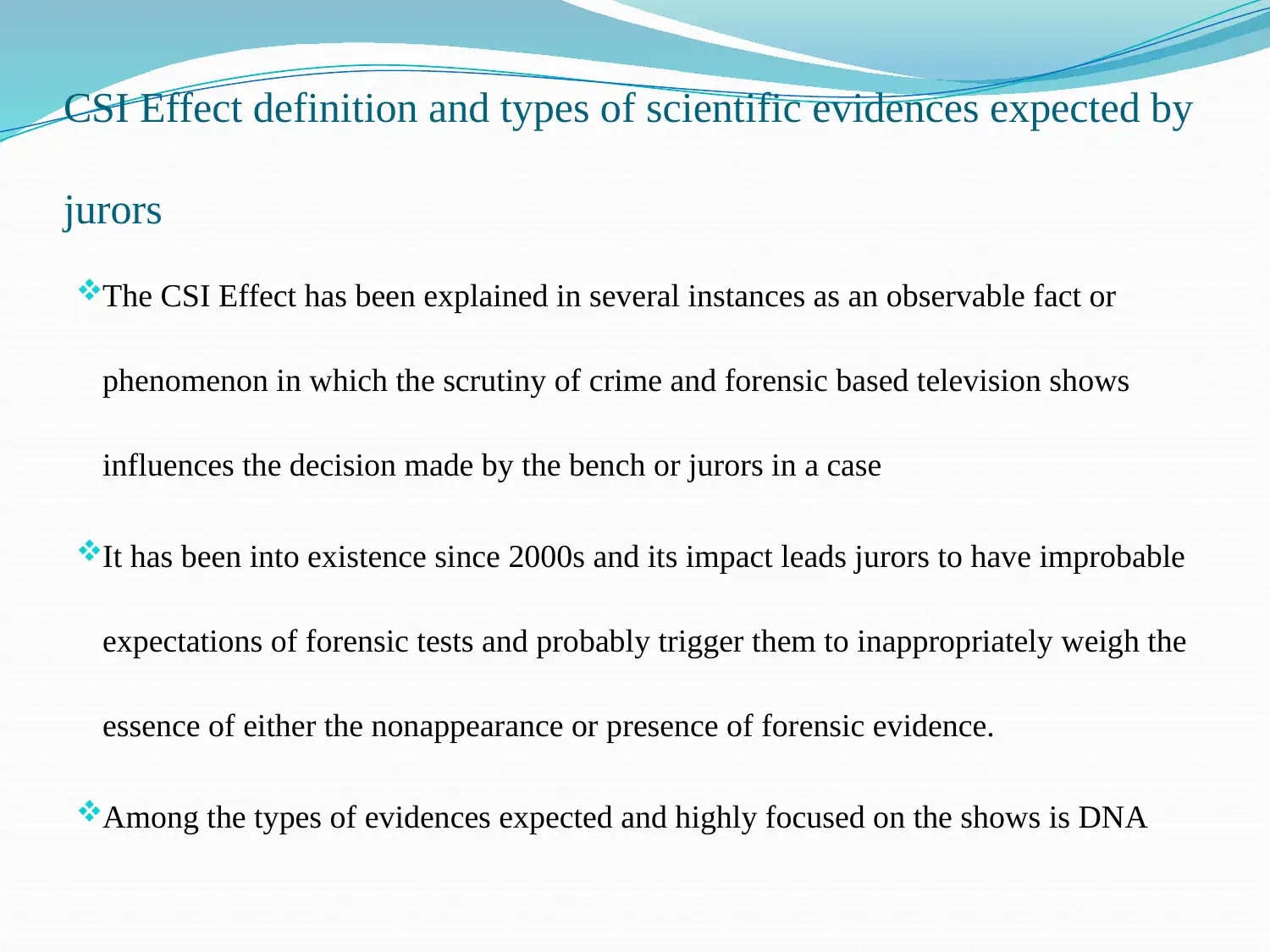
CSI Effect definition and types of scientific evidences expected by
jurors
The CSI Effect has been explained in several instances as an observable fact or
phenomenon in which the scrutiny of crime and forensic based television shows
influences the decision made by the bench or jurors in a case
It has been into existence since 2000s and its impact leads jurors to have improbable
expectations of forensic tests and probably trigger them to inappropriately weigh the
essence of either the nonappearance or presence of forensic evidence.
Among the types of evidences expected and highly focused on the shows is DNA
jurors
The CSI Effect has been explained in several instances as an observable fact or
phenomenon in which the scrutiny of crime and forensic based television shows
influences the decision made by the bench or jurors in a case
It has been into existence since 2000s and its impact leads jurors to have improbable
expectations of forensic tests and probably trigger them to inappropriately weigh the
essence of either the nonappearance or presence of forensic evidence.
Among the types of evidences expected and highly focused on the shows is DNA
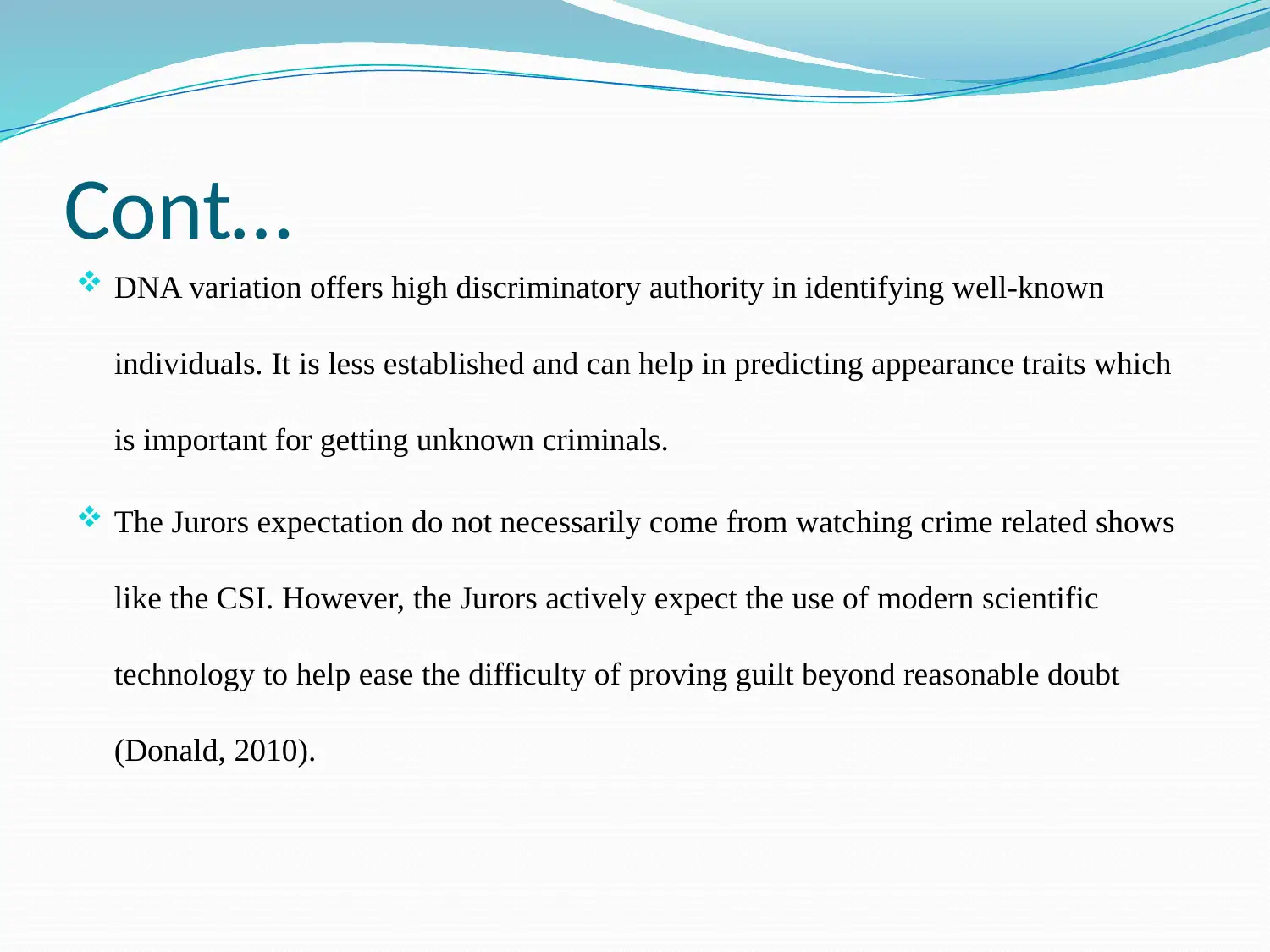
Cont…
DNA variation offers high discriminatory authority in identifying well-known
individuals. It is less established and can help in predicting appearance traits which
is important for getting unknown criminals.
The Jurors expectation do not necessarily come from watching crime related shows
like the CSI. However, the Jurors actively expect the use of modern scientific
technology to help ease the difficulty of proving guilt beyond reasonable doubt
(Donald, 2010).
DNA variation offers high discriminatory authority in identifying well-known
individuals. It is less established and can help in predicting appearance traits which
is important for getting unknown criminals.
The Jurors expectation do not necessarily come from watching crime related shows
like the CSI. However, the Jurors actively expect the use of modern scientific
technology to help ease the difficulty of proving guilt beyond reasonable doubt
(Donald, 2010).
⊘ This is a preview!⊘
Do you want full access?
Subscribe today to unlock all pages.

Trusted by 1+ million students worldwide
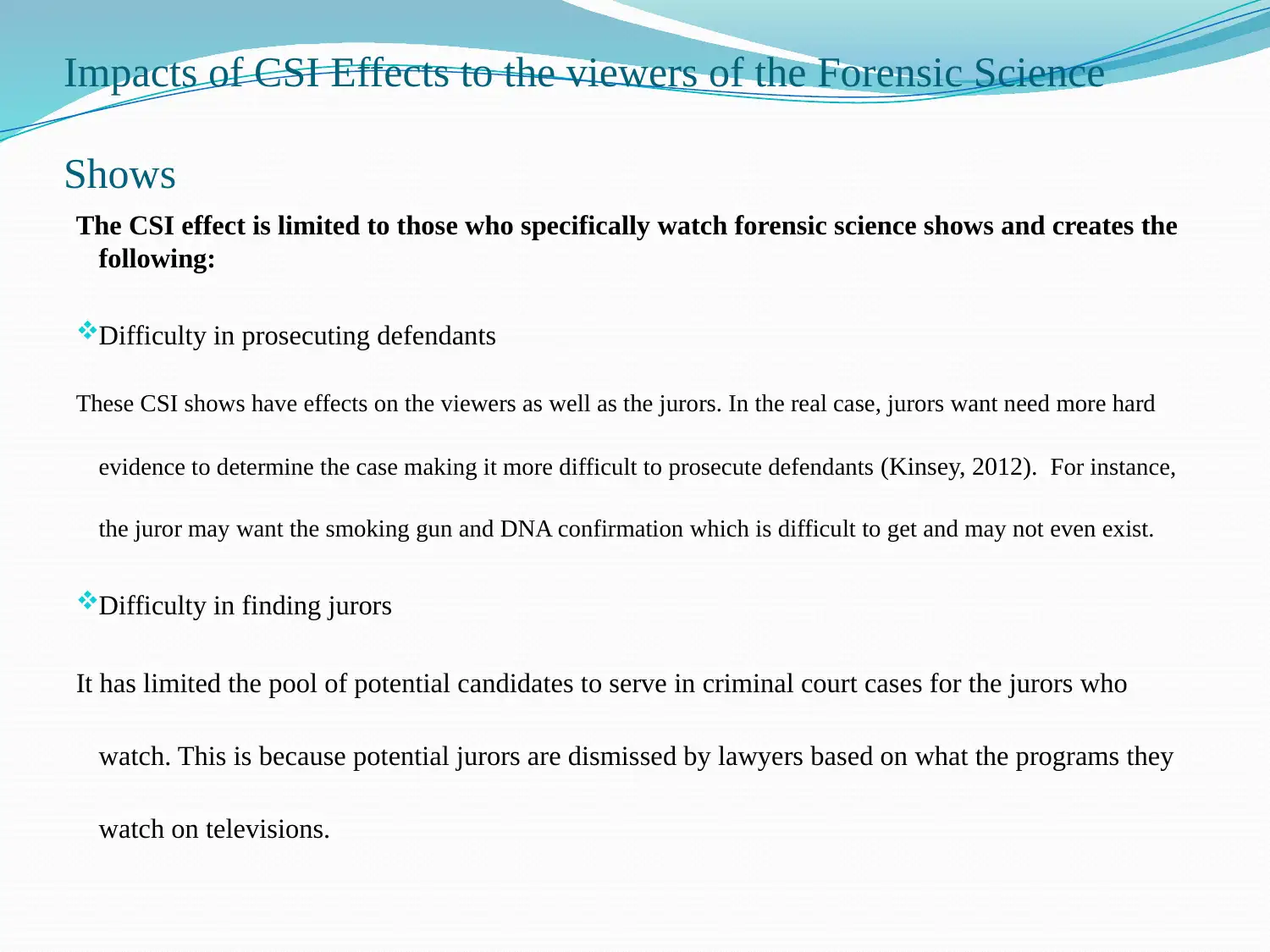
Impacts of CSI Effects to the viewers of the Forensic Science
Shows
The CSI effect is limited to those who specifically watch forensic science shows and creates the
following:
Difficulty in prosecuting defendants
These CSI shows have effects on the viewers as well as the jurors. In the real case, jurors want need more hard
evidence to determine the case making it more difficult to prosecute defendants (Kinsey, 2012). For instance,
the juror may want the smoking gun and DNA confirmation which is difficult to get and may not even exist.
Difficulty in finding jurors
It has limited the pool of potential candidates to serve in criminal court cases for the jurors who
watch. This is because potential jurors are dismissed by lawyers based on what the programs they
watch on televisions.
Shows
The CSI effect is limited to those who specifically watch forensic science shows and creates the
following:
Difficulty in prosecuting defendants
These CSI shows have effects on the viewers as well as the jurors. In the real case, jurors want need more hard
evidence to determine the case making it more difficult to prosecute defendants (Kinsey, 2012). For instance,
the juror may want the smoking gun and DNA confirmation which is difficult to get and may not even exist.
Difficulty in finding jurors
It has limited the pool of potential candidates to serve in criminal court cases for the jurors who
watch. This is because potential jurors are dismissed by lawyers based on what the programs they
watch on televisions.
Paraphrase This Document
Need a fresh take? Get an instant paraphrase of this document with our AI Paraphraser
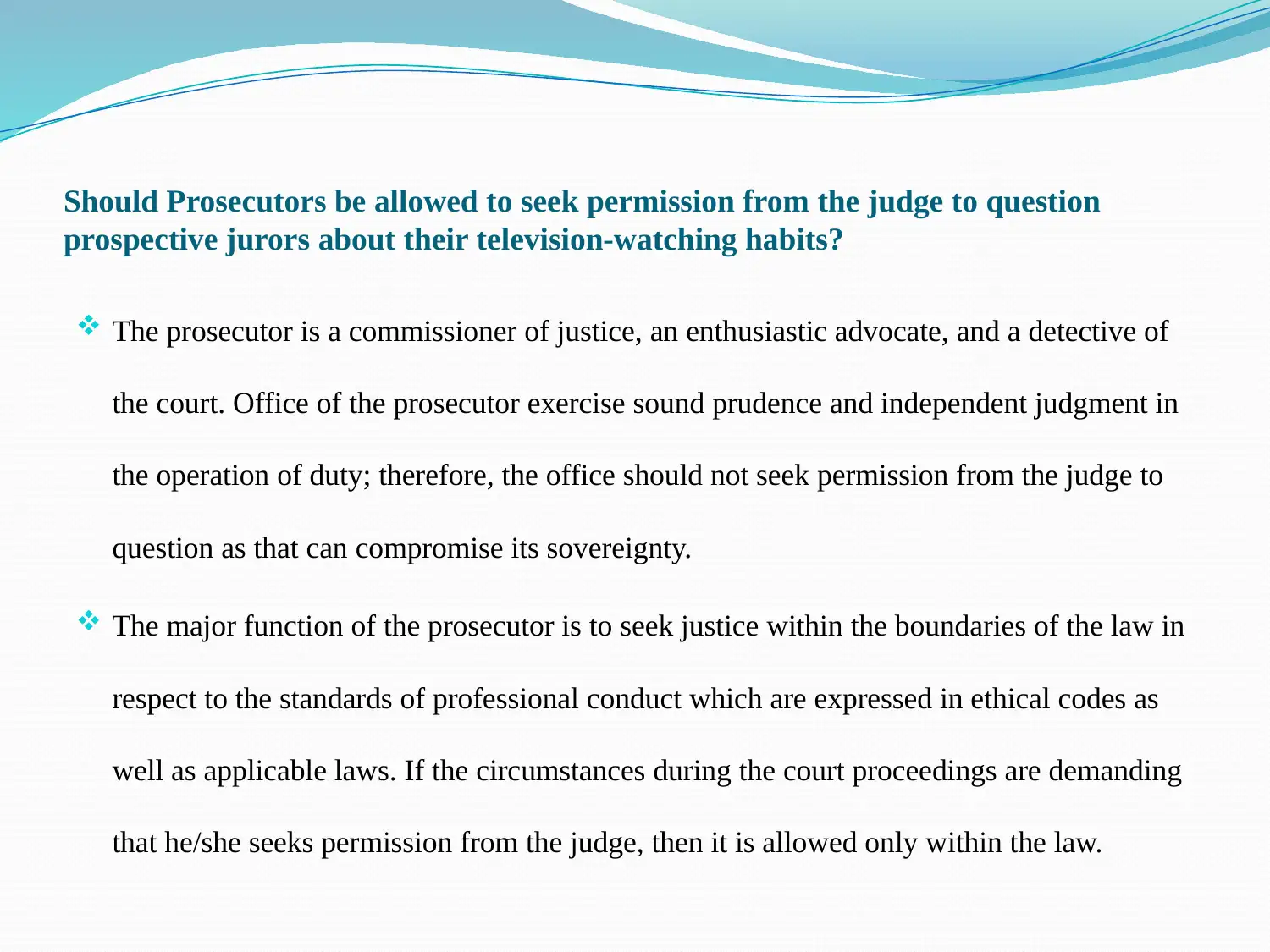
Should Prosecutors be allowed to seek permission from the judge to question
prospective jurors about their television-watching habits?
The prosecutor is a commissioner of justice, an enthusiastic advocate, and a detective of
the court. Office of the prosecutor exercise sound prudence and independent judgment in
the operation of duty; therefore, the office should not seek permission from the judge to
question as that can compromise its sovereignty.
The major function of the prosecutor is to seek justice within the boundaries of the law in
respect to the standards of professional conduct which are expressed in ethical codes as
well as applicable laws. If the circumstances during the court proceedings are demanding
that he/she seeks permission from the judge, then it is allowed only within the law.
prospective jurors about their television-watching habits?
The prosecutor is a commissioner of justice, an enthusiastic advocate, and a detective of
the court. Office of the prosecutor exercise sound prudence and independent judgment in
the operation of duty; therefore, the office should not seek permission from the judge to
question as that can compromise its sovereignty.
The major function of the prosecutor is to seek justice within the boundaries of the law in
respect to the standards of professional conduct which are expressed in ethical codes as
well as applicable laws. If the circumstances during the court proceedings are demanding
that he/she seeks permission from the judge, then it is allowed only within the law.
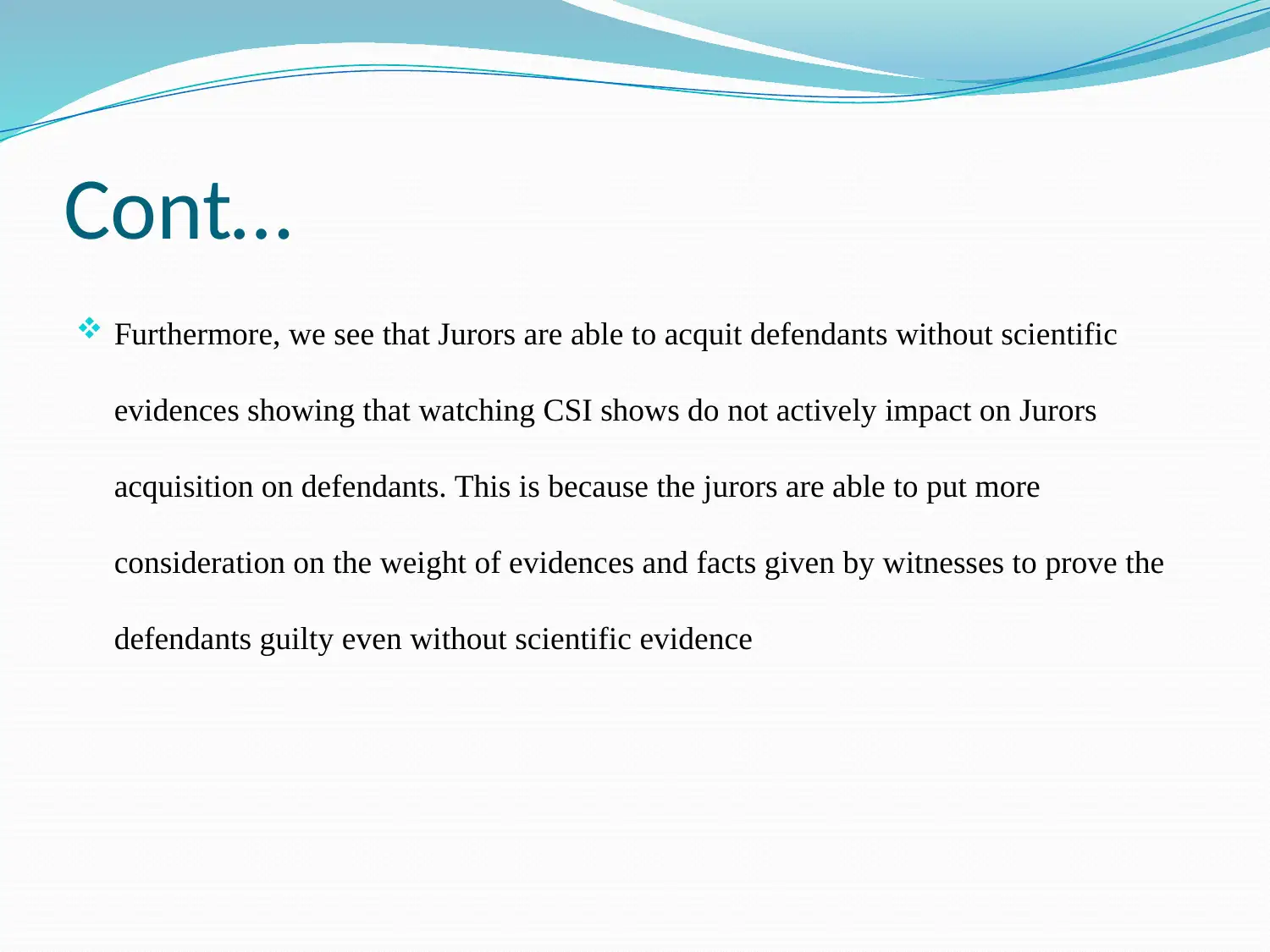
Cont…
Furthermore, we see that Jurors are able to acquit defendants without scientific
evidences showing that watching CSI shows do not actively impact on Jurors
acquisition on defendants. This is because the jurors are able to put more
consideration on the weight of evidences and facts given by witnesses to prove the
defendants guilty even without scientific evidence
Furthermore, we see that Jurors are able to acquit defendants without scientific
evidences showing that watching CSI shows do not actively impact on Jurors
acquisition on defendants. This is because the jurors are able to put more
consideration on the weight of evidences and facts given by witnesses to prove the
defendants guilty even without scientific evidence
⊘ This is a preview!⊘
Do you want full access?
Subscribe today to unlock all pages.

Trusted by 1+ million students worldwide
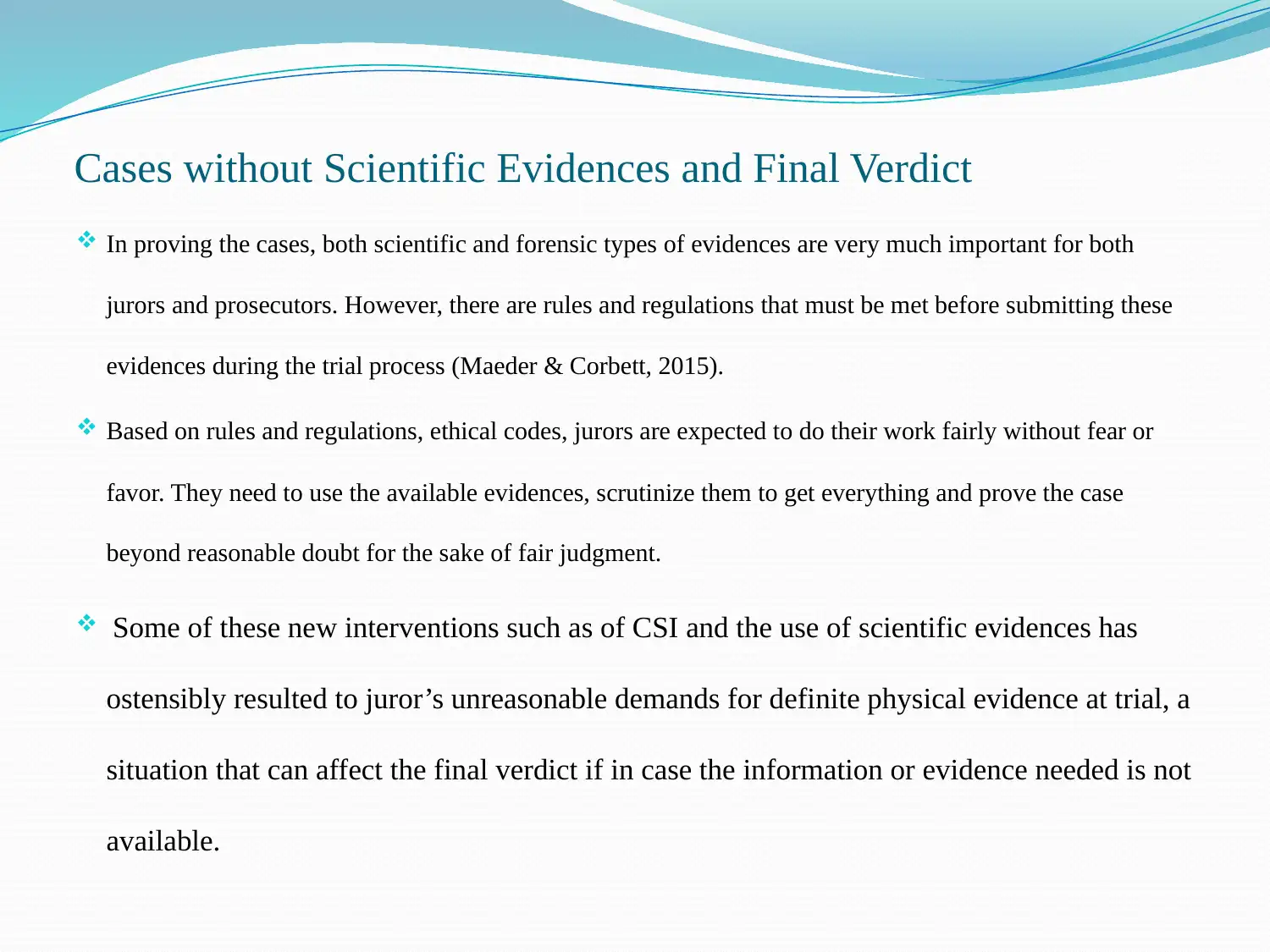
Cases without Scientific Evidences and Final Verdict
In proving the cases, both scientific and forensic types of evidences are very much important for both
jurors and prosecutors. However, there are rules and regulations that must be met before submitting these
evidences during the trial process (Maeder & Corbett, 2015).
Based on rules and regulations, ethical codes, jurors are expected to do their work fairly without fear or
favor. They need to use the available evidences, scrutinize them to get everything and prove the case
beyond reasonable doubt for the sake of fair judgment.
Some of these new interventions such as of CSI and the use of scientific evidences has
ostensibly resulted to juror’s unreasonable demands for definite physical evidence at trial, a
situation that can affect the final verdict if in case the information or evidence needed is not
available.
In proving the cases, both scientific and forensic types of evidences are very much important for both
jurors and prosecutors. However, there are rules and regulations that must be met before submitting these
evidences during the trial process (Maeder & Corbett, 2015).
Based on rules and regulations, ethical codes, jurors are expected to do their work fairly without fear or
favor. They need to use the available evidences, scrutinize them to get everything and prove the case
beyond reasonable doubt for the sake of fair judgment.
Some of these new interventions such as of CSI and the use of scientific evidences has
ostensibly resulted to juror’s unreasonable demands for definite physical evidence at trial, a
situation that can affect the final verdict if in case the information or evidence needed is not
available.
Paraphrase This Document
Need a fresh take? Get an instant paraphrase of this document with our AI Paraphraser
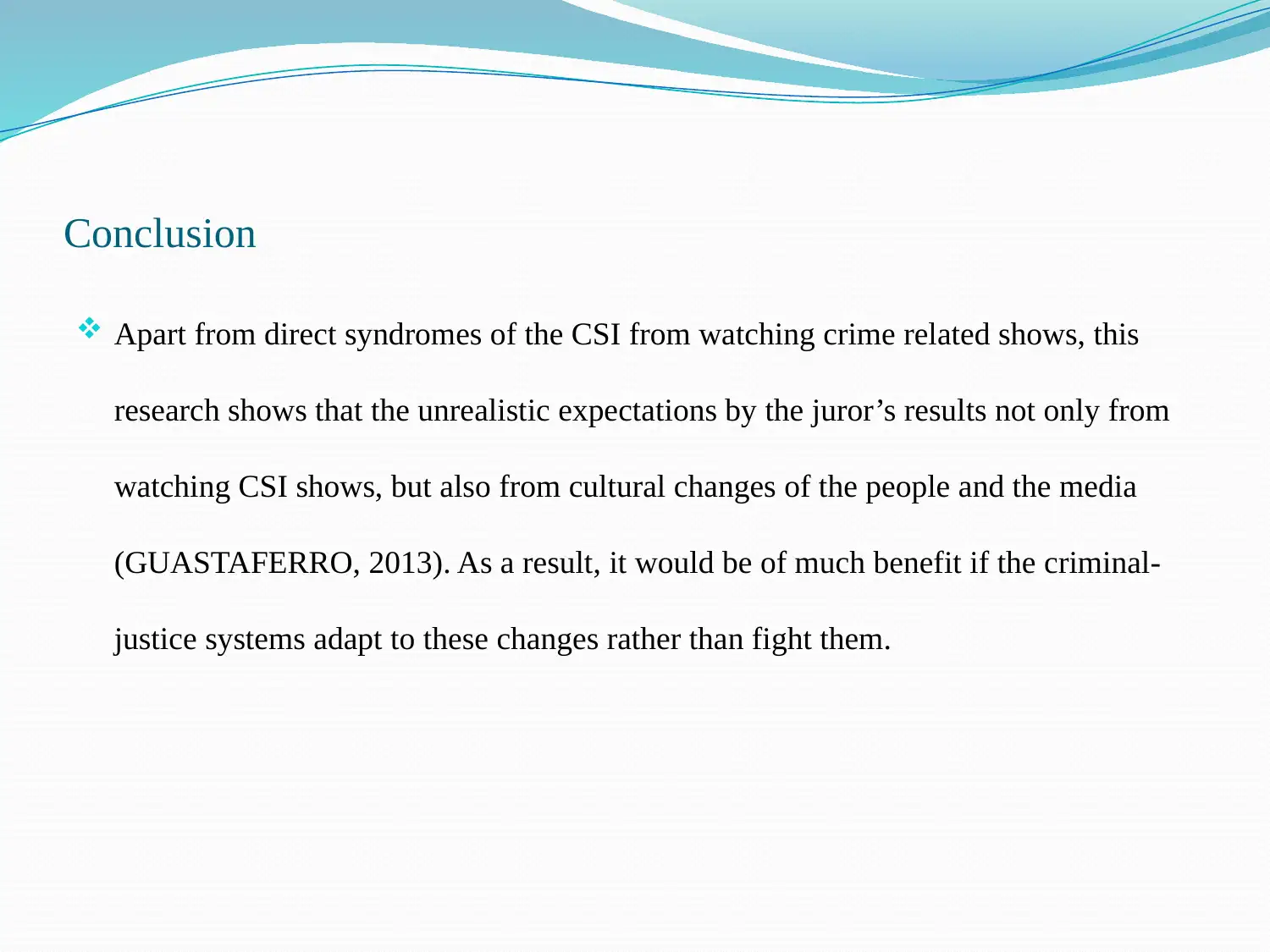
Conclusion
Apart from direct syndromes of the CSI from watching crime related shows, this
research shows that the unrealistic expectations by the juror’s results not only from
watching CSI shows, but also from cultural changes of the people and the media
(GUASTAFERRO, 2013). As a result, it would be of much benefit if the criminal-
justice systems adapt to these changes rather than fight them.
Apart from direct syndromes of the CSI from watching crime related shows, this
research shows that the unrealistic expectations by the juror’s results not only from
watching CSI shows, but also from cultural changes of the people and the media
(GUASTAFERRO, 2013). As a result, it would be of much benefit if the criminal-
justice systems adapt to these changes rather than fight them.
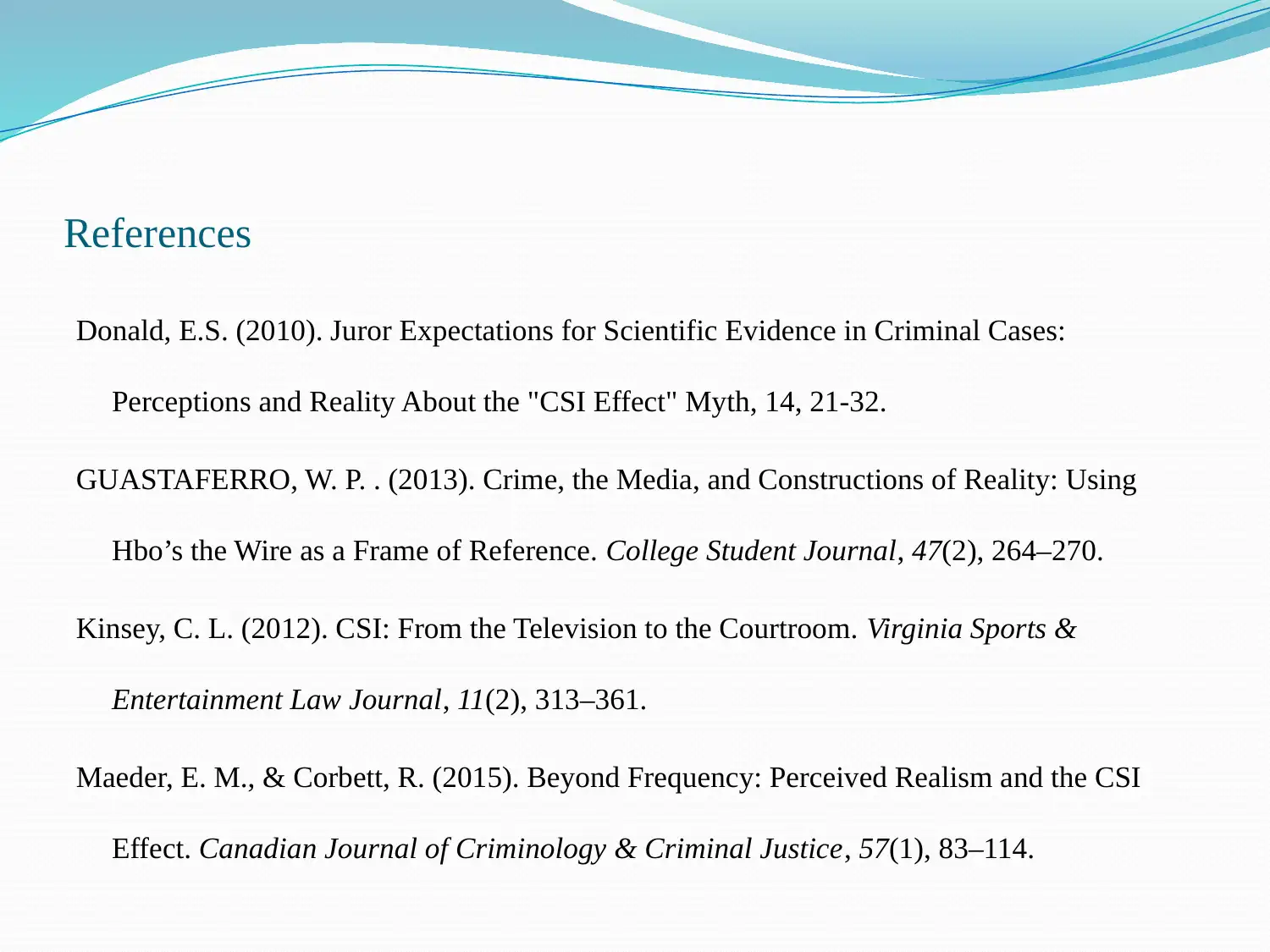
References
Donald, E.S. (2010). Juror Expectations for Scientific Evidence in Criminal Cases:
Perceptions and Reality About the "CSI Effect" Myth, 14, 21-32.
GUASTAFERRO, W. P. . (2013). Crime, the Media, and Constructions of Reality: Using
Hbo’s the Wire as a Frame of Reference. College Student Journal, 47(2), 264–270.
Kinsey, C. L. (2012). CSI: From the Television to the Courtroom. Virginia Sports &
Entertainment Law Journal, 11(2), 313–361.
Maeder, E. M., & Corbett, R. (2015). Beyond Frequency: Perceived Realism and the CSI
Effect. Canadian Journal of Criminology & Criminal Justice, 57(1), 83–114.
Donald, E.S. (2010). Juror Expectations for Scientific Evidence in Criminal Cases:
Perceptions and Reality About the "CSI Effect" Myth, 14, 21-32.
GUASTAFERRO, W. P. . (2013). Crime, the Media, and Constructions of Reality: Using
Hbo’s the Wire as a Frame of Reference. College Student Journal, 47(2), 264–270.
Kinsey, C. L. (2012). CSI: From the Television to the Courtroom. Virginia Sports &
Entertainment Law Journal, 11(2), 313–361.
Maeder, E. M., & Corbett, R. (2015). Beyond Frequency: Perceived Realism and the CSI
Effect. Canadian Journal of Criminology & Criminal Justice, 57(1), 83–114.
⊘ This is a preview!⊘
Do you want full access?
Subscribe today to unlock all pages.

Trusted by 1+ million students worldwide
1 out of 9
Related Documents
Your All-in-One AI-Powered Toolkit for Academic Success.
+13062052269
info@desklib.com
Available 24*7 on WhatsApp / Email
![[object Object]](/_next/static/media/star-bottom.7253800d.svg)
Unlock your academic potential
Copyright © 2020–2026 A2Z Services. All Rights Reserved. Developed and managed by ZUCOL.



